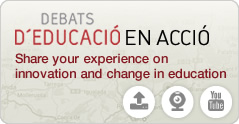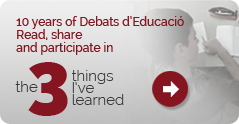- Català
- Español
- English
You are here
The Edcamp movement: a peer-to-peer learning initiative for educators
About the speaker
Kristen Swanson
Chair of the Edcamp Foundation Board
Summary of ideas
What are the key elements that make adult learning meaningful?
- Learning that is self-led and autonomous. We choose what and how we want to learn. Social. To learn,you don’t always need to be an expert. You can learn by sharing experiences with people who you trust.
- Learning must be valuable.
The creation of Edcamp
- 2009. People started sharing educational experiences on Twitter.
- 2010. The first Edcamp event in Philadelphia, physically bringing together people working in educationwith a desire to share their experiences and learn from those of others. Over one hundred people turned up.
- 2016. Edcamps have multiplied across the United States. There are now five or six each weekend. There are also similar events happening outside the United States.
What are the key features of Edcamps?
- They are free.
- They are open to everyone and any topic.
- No one is selling anything.
- Anyone can offer a session and everyone can give input based on their experience. Each person is responsible for their own learning. If you are interested in a topic, you have to ask questions, while also contributing whatever knowledge you might have.
- The rule of two feet. You need a clear idea of what it is that you want to learn. If one discussion doesn’t interest you, have a change of scenery and go try another. It’s a form of learning that is a little bit ‘selfish’.
Why has the Edcamp initiative been successful?
- It coincided with the mass growth of Twitter, which is a very easy way for people to get in contact and share things.
- In the United States, people were very concerned about how to implement the No Child Left Behind Act.
- Teachers trust in other teachers.
- More and more technology was being used in classrooms and people needed to share in order to learn how to use the technology more effectively.
Kristen Swanson’s advice for social learning
- We shouldn’t be ashamed about sharing.
- We need to concentrate our efforts on our surroundings (being open and active towards the sharing of knowledge) rather than on the content.
- We need to have an experimental mentality. We have to be open to trying new things.
- We have to find our ‘tribe’. We have to escape feelings of isolation.
- We have to share as much as we can.
With the cooperation of:
Discover
other ideas
-

The Problem Solvers: from teaching students to fol...
Charles Leadbeater
2016 -

How should we build resilient schools to foster al...
Boris Cyrulnik
2016 -

Revolutionize schools with design thinking and pla...
Ross Flatt
2016







 The texts published on this website are, unless otherwise indicated, covered by the Creative Commons Spain Attribution - Non Commercial - No Derivs 3.0 licence. You may copy, distribute and transmit the work, provided you attribute it (authorship, journal name, publisher) in the manner specified by the author(s) or licensor(s). You may not use the material for commercial purposes. You may not transmit any derivative work from this material. The full text of the licence can be consulted here:
The texts published on this website are, unless otherwise indicated, covered by the Creative Commons Spain Attribution - Non Commercial - No Derivs 3.0 licence. You may copy, distribute and transmit the work, provided you attribute it (authorship, journal name, publisher) in the manner specified by the author(s) or licensor(s). You may not use the material for commercial purposes. You may not transmit any derivative work from this material. The full text of the licence can be consulted here: